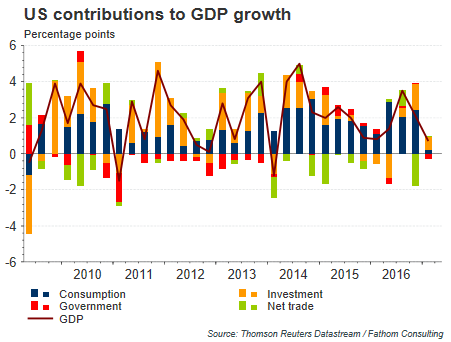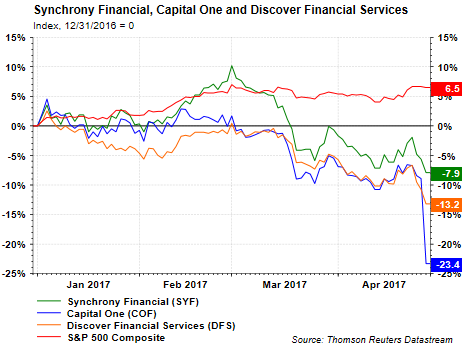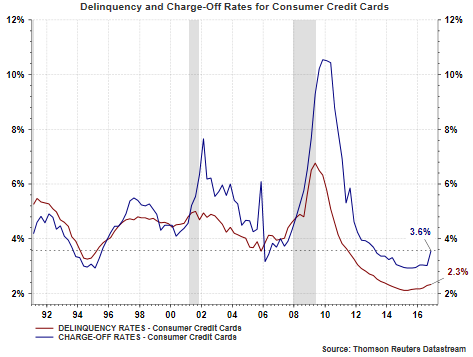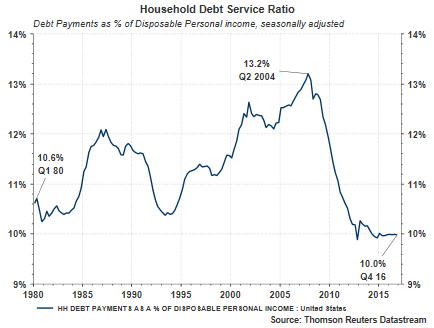The first reading for Q1 2017 GDP came in at a weak .7% at an annualized rate. A particularly weak component of the report was consumer spending which rose only .3% and is the weakest level for spending since the fourth quarter of 2009. The blue portion of the bars in the below chart represent the consumer contribution to GDP and the weak report in Q1 2017 is evident.

Over the past few years, first quarter GDP numbers have been weak for a number of reason. However, many believe there are issues with the government's seasonal adjustment factor. Nonetheless, is there something else impacting the consumer which could indicate potential headwinds lie ahead for the economy and is being reflected in recent credit card data?
This past week, several financial firms reported earnings, Synchrony Financial (SYF), Capital One Financial (NYSE:COF) and Discover Financial Services (NYSE:DFS) and each company has a sizable portion of their business in consumer credit cards. Earnings for both SYF and COF were anything but positive relative to expectations. DFS earnings were not too weak and the company reported only a small earnings miss. Below are some comments from the company conference calls and/or earnings press releases.
Capital One Financial Corporation (NYSE:COF):
- Net income fell 22% to $752 million while its earnings per share of $1.54 came in 39 cents below the average estimates of analysts. The company increased its loan loss provision by 30% year over year to $1.9 billion, as the 30-day plus delinquency rate climbed 28 basis points, to 2.92%. Meanwhile, net charge-offs rose 28% to $1.5 billion and its rate of net charge-offs to total loans increased 42 basis points to 2.5%. Most of the delinquencies and charge-offs were in the bank's credit card and auto loan portfolios (emphasis added).
Synchrony Financial (NYSE:SYF):
- First quarter net earnings totaled $499 million or 61 cents per diluted share versus average analysts' estimates of 73 cents. Our results were impacted by the 45% increase in the provision for loan losses we experienced this quarter. The reserve build from the fourth quarter equalled $322 million. The reserve builds for the next couple of quarters are likely to be in a similar range on a dollar basis to what we saw this quarter.While most of the build continues to be driven by growth and the normalization we are seeing in the portfolio, lower recovery pricing in the quarter also drove approximately $50 million of additional reserves or 7 basis points of coverage. The net charge-off rate was 5.33% compared to 4.74% last year. we now expect NCOs to be in the 5% to low-5% range this year (emphasis added.)
In regards to lower cost recovery, this refers to credit card companies selling troubled credit card debt to third party collection firms. As noted in the Synchrony conference call,
- Company saw an incremental decline in recovery pricing this quarter. We believe it's driven by a combination of factors, including just the fact that you've got increased supply in the market. As charge-offs start to normalize across the industry, which we've seen, you've got that dynamic. So you've got just increased supply in the market, which we think is impacting the price.
Bank of America (NYSE:BAC):
- Total net charge-offs of $934MM increased $54MM from 4Q16. Increase driven by consumer due to seasonally higher credit card losses, while commercial charge-offs were relatively flat. Net charge-off ratio increased modestly from 4Q16 to 0.42%, but declined from 1Q16. Provision expense of $835MM increased $61MM from 4Q16, driven primarily by consumer (emphasis added.)
Discover Financial (DFS) also reported weaker earnings of $1.43, but the miss was only 3 cents. DFS also cited caution on credit and indicated credit card portfolios are normalizing to a higher more historical loss rate. DFS also increased the company's provision expense.
The below chart compares the performance of the credit card firms to each other and the S&P 500 Index. The lower than expected earnings results had a negative impact on the prices of the stocks as can be seen below.

As the below table shows, credit card delinquency rates are below historical levels. On the other hand charge-off rates are trending higher and near economic late cycle levels.

Supporting a leveling off for charge offs and delinquencies is the fact the household debt service ratio remains at a very low level.

With charge-offs and delinquencies normalizing to higher and more so-called normal levels, maybe some stability is near. The fact companies are reporting lower loss recovery rates is also an indication of broader weakness in the credit card sector of the consumer economy. Recovery rate weakness occurs as the supply of delinquent credit card receivables increases and third party collection firms can pay credit card companies less for this type of loan paper.
Given the much weaker GDP report in the most recent quarter and the weakness beginning to show up in credit card portfolios, these are yellow flags that investors should monitor for signs of further economic weakness. The current expansion is now the third longest since World War II and the economy will not expand forever. At this point though, based on other recession variables we review, we do not foresee a recession looking out the next 18 months or so.
